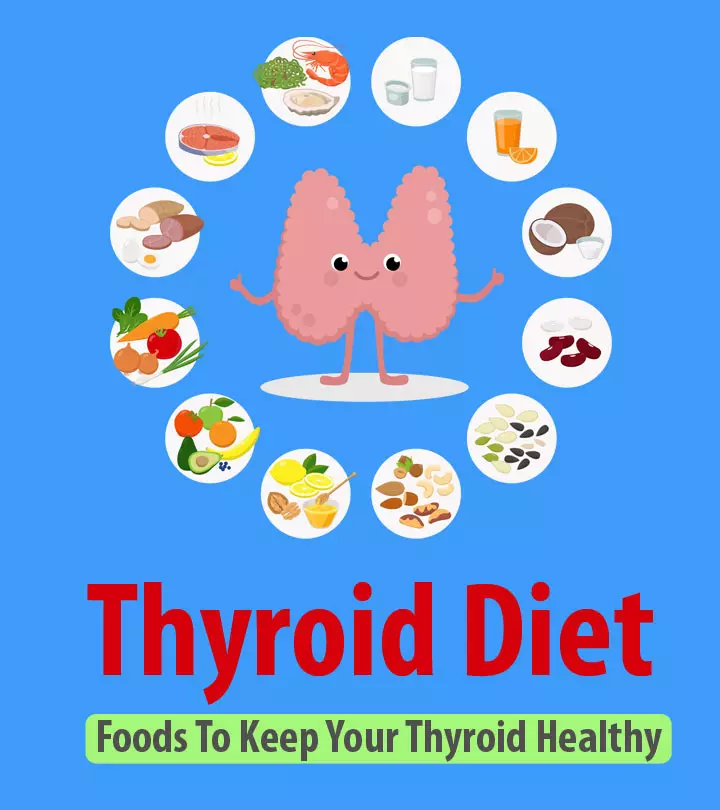Common Hypothyroidism Medication Mistakes You Need To Avoid At All Cost
Avoid harmful errors with your treatment plan by learning essential tips for safe healing.

Image: Shutterstock
Hypothyroidism is a medical condition where the thyroid gland doesn’t produce enough thyroid hormone (1). This health condition is unfortunately more common than you think, and affects millions of people worldwide. Managing thyroid problems typically involves medication to regulate hormone levels. However, certain common medication mistakes can impede the progress or even exacerbate the symptoms. Understanding and avoiding these pitfalls is crucial for effective management and improved well-being. Read on to know them all!
In This Article
1. Skipping Medication
Consistency is key in managing hypothyroidism. Skipping doses or irregular intake of medication disrupts hormone levels and can lead to fluctuations in symptoms. It’s essential to take prescribed medication as directed by a healthcare professional, even if the symptoms seem under control. Make sure you set reminders or incorporate medication intake into your daily routine to maintain consistency.
2. Taking Medicine In Incorrect Timing Or Interaction with Other Medications
Timing matters when it comes to thyroid medication. Some medications, supplements, or even certain foods can interfere with the absorption of thyroid hormone replacement. Iron supplements, antacids, calcium supplements, and certain antibiotics are known to hinder absorption (2). Ensure a gap of at least four hours between thyroid medication and these substances to avoid interactions that affect its efficacy.
3. Not Monitoring And Adjusting Dosage
Hypothyroidism treatment often requires regular monitoring and adjustments in medication dosage. Ignoring follow-up appointments or blood tests recommended by healthcare providers can result in an inappropriate dosage. Periodic assessments help fine-tune medication dosage to maintain optimal thyroid hormone levels, ensuring the best possible symptom management.
4. Self-Medicating Or Adjusting Dosage Without Professional Guidance
Self-medicating or altering dosage without medical advice can have unwanted consequences. It’s crucial to consult a healthcare professional before making any changes to the prescribed dosage. Adjusting medication based on personal assumptions or internet advice might disrupt hormone levels and worsen the symptoms.
5. Not Understanding Medication Instructions
Misinterpreting medication instructions can lead to errors in dosage. It’s essential to thoroughly understand how to take the prescribed medication. You should ask questions during medical appointments to ensure clarity. Consulting a pharmacist for clarification can also help prevent misunderstandings.
6. Overlooking Lifestyle Factors
Certain lifestyle factors can affect how the body absorbs thyroid medication. For instance, taking the medication on an empty stomach in the morning, at least 30 minutes before eating, and avoiding other medications or supplements can optimize absorption. Understanding and adhering to these guidelines can significantly impact the medication’s effectiveness.
7. Not Reporting Symptoms Or Side Effects To Healthcare Providers
Ignoring symptoms or side effects related to thyroid medication can be dangerous. Changes in symptoms, whether improvement or exacerbation, should be reported to healthcare providers. Similarly, adverse reactions or side effects, such as palpitations, insomnia, or mood changes, should be communicated promptly for appropriate intervention or adjustments in medication.
Avoid Medication Mistakes
Effective management of hypothyroidism involves a comprehensive approach that extends beyond medication alone. Here are some tips to navigate this journey more effectively:
1. Maintain Open Communication With Your Doctor
Establish a collaborative relationship with your healthcare providers. Communicate openly about concerns, symptoms, and any other challenges faced during your treatment.
2. Make Sure You Follow-Up With Your Doctor And Monitor Your Health
Adhere to scheduled follow-up appointments and recommended blood tests to monitor thyroid hormone levels and ensure appropriate adjustments in medication.
3. Educate Yourself
Understand the condition, treatment options, and how medication works. Knowledge empowers better decision-making and adherence to treatment plans.
4. Healthy Lifestyle
Incorporate a balanced diet, regular exercise, and stress management techniques into your routine. A healthy lifestyle complements medication in managing hypothyroidism.
5. Support Networks
Seek support from online communities or support groups. Sharing experiences and insights can offer valuable guidance and emotional support.
Foods That Are Good For Thyroid
When it comes to supporting thyroid health, incorporating specific foods into your diet can make a notable difference. For those managing thyroid issues like hypothyroidism, iodine-rich foods like seaweed, dairy products, and iodized salt can aid in hormone production. Additionally, selenium-rich foods such as Brazil nuts, fish, and whole grains can support the conversion of thyroid hormones. Incorporating sources of zinc like nuts, seeds, and legumes can also aid in thyroid function.
Moreover, focusing on foods high in antioxidants, like fruits and vegetables, can help reduce inflammation associated with thyroid conditions. Leafy greens, berries, and colorful veggies are excellent choices. Lastly, including omega-3 fatty acids found in fatty fish, flaxseeds, and walnuts can support overall thyroid health. A balanced diet with these nutrient-rich foods can complement medical treatment and contribute to improved thyroid function. Always consult a healthcare professional for personalized dietary recommendations concerning thyroid health.
Avoiding common medication mistakes is pivotal in effectively managing hypothyroidism and enhancing overall well-being. By being proactive, informed, and committed to consistent treatment, individuals with hypothyroidism can navigate their journey towards better health with greater confidence and success. Remember, effective management lies in a partnership between the individual and their healthcare team, working together towards optimal health and well-being.
Read full bio of Indrani Karmakar

































Community Experiences
Join the conversation and become a part of our empowering community! Share your stories, experiences, and insights to connect with other beauty, lifestyle, and health enthusiasts.